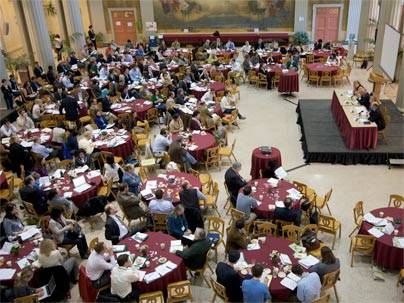MIT's Sustainability Summit, the first of what is expected to be an annual event, was held last week at Walker Hall and garnered a full-house turnout for a series of talks, panel discussions and breakout sessions. The summit capped four days of Earth Week activities on campus, and was the lead achievement of the new student organization called Sustainability@MIT.
The summit, titled "Discovering New Dimensions for Growth," focused on the growing awareness and need for businesses to incorporate concepts of sustainability in their planning.
"Sustainability is no longer something we just do on a good day," said Mindy Lubber, president of Ceres, a coalition of investors and environmental leaders, speaking at one of the summit's panel discussions. She said that even in today's difficult economic climate, sustainability now "is essential, it's imperative … it's a bottom-line financial issue." For businesses today, integrating sustainable practices into their planning is necessary "not because it feels good, but because there are real costs" to unsustainable business-as-usual practices.
She pointed out that already companies such as DuPont and Walmart have saved tens to hundreds of millions of dollars by adopting more energy-efficient and sustainable practices. "There is a real price to carbon," she said, and failing to heed the warnings about global climate change could lead to social and economic disaster that "will make the sub-prime meltdown look like child's play."
Michael Wise, a partner at business consulting firm A.T. Kearney, echoed that sense of the importance of addressing sustainability as an essential business issue. His company analyzed a range of similar companies, some of which had explicitly addressed sustainability in their planning and some had not. "In 16 of the 18 cases that we looked at, the sustainable businesses outperformed their peers," he said during the panel discussion.
Sustainability@MIT's co-president Kat Potter, a graduate student in Earth sciences, said, "There definitely seems to be a growing awareness of sustainability, it seems to be something in more people's minds." As one of the group's projects, it produced a guide to sustainable catering, listing more than a dozen local catering services that either specialize in sustainable catering practices or are willing to accommodate such requests from clients. When people who have hired catering services for campus events received the new guide "they were just so excited about it," she says.
In order to practice what they preach, said Adam Siegel, a second-year student at the MIT Sloan School of Management who was co-organizer of the summit, group members worked to make it a "low-waste event," minimizing paper products both for publicity and for the meeting itself. The posters and programs were printed on recycled paper made from agricultural waste, he says, and the event's caterers used minimal packaging. To further minimize the waste, he said, "We have been relying quite a lot on Internet-based publicity."
The issue of sustainability is one that has been attracting increasing interest from students in recent years. Siegel said there seems to be particularly strong involvement from students at the Sloan School and the Department of Urban Studies and Planning. "The orientation of those two disciplines is more holistic," he said. He suggested that's because such thinking is required "to lead an organization, whether a city or a corporation. Managers in the business world, and city planners, have to think at more systemic levels than in pure science or pure engineering."
Summit co-organizer Catharina Lavers added that, "We are seeing a marked increase in interest in sustainability, beyond the core group of usual suspects. There is a realization and acceptance that sustainability is not just for tree-huggers anymore."
Siegel said that in organizing this first-ever summit "we've built a strong platform that future leaders of the club will be able to build on and grow" in coming years.
A version of this article appeared in MIT Tech Talk on April 29, 2009 (download PDF).






